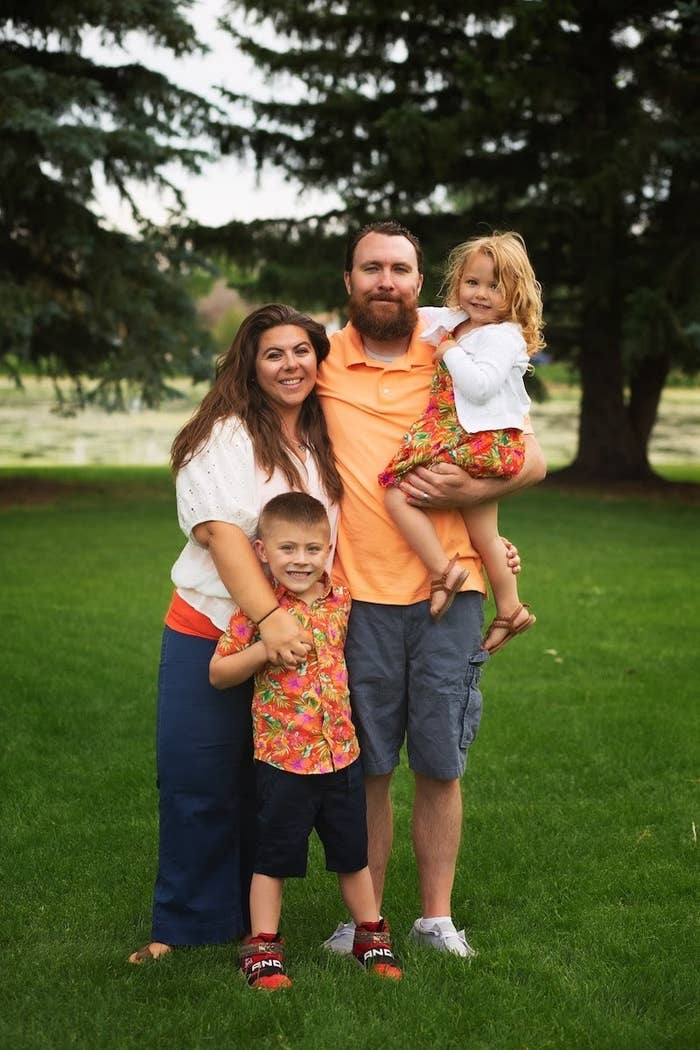
Hannah S. had gotten her period three weeks earlier and was on birth control, but something just didn’t feel quite right with her body.
The then-19-year-old sophomore at a Catholic-affiliated college in Kansas decided to take a pregnancy test, thinking she’d rule out the possibility.
It was positive. She was about five and a half weeks pregnant.
Hannah didn’t want to disrupt her education to raise a child with her then-boyfriend, so she called a Planned Parenthood near her school to make an appointment for an abortion. The soonest they could see her was one week later.
In the meantime, Hannah went to classes and tried to carry on with normal life as much as possible, but she said she cried frequently.
“When you hold a secret it just starts to eat away at you,” Hannah said.
She didn’t tell her friends, fearing the reactions she would receive at a pro-life institution. The only person she confided in other than her boyfriend was her sister, who is seven years older than her and also had an abortion early in her college years. It was the first time Hannah admitted she knew of her sister’s pregnancy.
She only had to ask her sister “How did you make it through your abortion?” before her sibling knew what was happening and provided support over the phone.
A few days later at the clinic, Hannah requested to hear the heartbeat (although she had never heard one during the ultrasound). She repeatedly told medical providers she was sure about her decision to terminate the pregnancy. At six weeks and four days of pregnancy, she took the first of two abortion pills at the clinic and swallowed the second one back at her dorm.
“I have never regretted my abortion, once,” said Hannah, now 28 years old and the mother of a 17-month-old child. She asked BuzzFeed News not to use her last name because in-laws do not know about her abortion and would not approve.
“I graduated from college cum laude, met my husband senior year, got my dream job, and we even started our own family in 2020. Had I not had the choice to do what I did, I would never be where I am today.”
But she’s found herself reeling from the knowledge that if she were living in Texas and in similar circumstances today, she’d have missed the deadline for a legal abortion by a mere four days.
Texas law SB 8, which went into effect Sept. 1, outlaws nearly all abortions after fetal cardiac activity can be detected, usually around the sixth week of a pregnancy. Pregnancy weeks are counted from the first day of a person's last menstrual period, so week six is typically two weeks after a missed period. And as more than 200 readers told BuzzFeed News, that’s often not enough time for a person to realize they’re pregnant, particularly if the pregnancy is unplanned.
Hannah said she couldn’t pinpoint a particular symptom that made her take the pregnancy test when she was 19. For others, the signs of pregnancy ranged from subtle to obvious: a trip to the emergency room for dizziness, suddenly craving Costco pizza, morning sickness, beer tasting like feet, irregular spotting, a dress that wouldn’t zip, a surprise at a routine Pap smear appointment.
Some people said they were working hard to have a child, aggressively tracking their periods, using ovulation test strips, monitoring their body temperature, or completing rounds of in vitro fertilization (IVF). Most of these respondents reported finding out by week four or five.
“If we were not trying, I would have completely dismissed my symptoms for my regular PMS,” Kassie Thomas, 33, said to BuzzFeed News. Thomas, who lives in Wyoming, found out she was pregnant at five and a half weeks with a home test in 2014.
She didn’t really expect to be pregnant; as a survivor of Hodgkin’s lymphoma with polycystic ovary syndrome, she and her husband had already tried and given up on fertility treatments. She took the test, she said, “for grins” before going out for drinks with her husband since her self-monitoring had shown she’d ovulated that month.
“It was a coincidence,” Thomas said. “If I hadn’t been wanting a child so much, I wouldn’t have taken a test. There would have been no way to know for me.”

As much as Thomas wanted her pregnancy, she’s been thinking about how impossible the timeline set by a law like SB 8 would have been had she chosen differently.
The weekend came right after her positive pregnancy test, making it virtually impossible to contact a medical provider. The nearest abortion clinic to her is hours away from where she lives, in a wealthier area of the state. If a six-week ban had been in effect, she also wouldn’t have had time to conduct genetic testing for any inherited medical conditions, which typically can’t happen before nine weeks. She didn’t end up conducting genetic testing, but would have wanted the opportunity if she and her husband chose to.
“With this bill, there are no choices,” Thomas said.
Most of the patients Dr. Meera Shah, a fellow with Physicians for Reproductive Health, sees at the New York Planned Parenthood where she provides abortion services are between eight to ten weeks pregnant.
Shah told BuzzFeed News it’s more common than not for people to have irregular cycles, not track periods, or attribute pregnancy symptoms to something else, leading them not to notice they’ve conceived until much later than six weeks.
Plenty of readers shared this experience. One person said they didn’t get a period while breastfeeding, making it nearly impossible to know they were pregnant. Another only suspected pregnancy after she didn’t get her period at the same time as her roommates, with whom she’d synched up cycles.
H, who uses she/they pronouns, is someone whose period doesn’t always fall on the same day. When at age 18 she started to feel physically “off,” she attributed it to stress at work.
“A naturally unregulated cycle varies,” H, who did not wish to be referred to by name for privacy concerns, told BuzzFeed News. “This is something non-uterus-having folks don’t understand. It’s like ‘Oh, it’s a full moon, you must have your period.’ No, that’s not how it works.”

When her then-partner said he noticed her breasts were larger than usual, H decided to take a test. It was positive, and she knew she did not want a reason to be attached to this partner for life. She got a doctor’s appointment at week six and scheduled a medication abortion for one week later.
Multiple people who found out near or after six weeks said they were not able to schedule an appointment with their doctor earlier.
One then-25-year-old woman tried to get her pregnancy confirmed after missing a period, but after her doctor couldn’t detect it via an ultrasound, she was told to come back in two weeks. It was the early days of the COVID-19 pandemic, and she and her husband did not feel it was the right time to have a child.
While waiting, the Texas resident started to get worried and considered driving to another state for care or seeking other self-managed options in order to end the pregnancy sooner than later.
“I was seeing my body start to change and you feel like you’re on this conveyor belt you just can’t stop,” she said. “Two weeks felt like an eternity.”
By the time her pregnancy was finally confirmed and she took the first abortion pill, she was seven weeks and six days. A year later, with SB 8 in effect, that would have been too late.
Nicole Bos, 37, is currently trying to have another child and doesn’t know how SB 8 could complicate her medical decisions.
The Frisco, Texas, resident had a miscarriage in August 2020 and knows her age could make her next pregnancy unviable as well. If that’s the case, she said she wouldn’t want to wait for a natural miscarriage, a process she fears could take months. The lack of clarity of whether that would qualify as a medical emergency and exemption under SB 8 has been frustrating.
“That gray area of what constitutes a medical emergency and physician discretion,” Bos said. “If I do choose to have a family like Gov. Abbott wants, but I’m not viable because of my age, I can’t do anything about it.”
Bos, who is the mother of a 4-year-old daughter, has already been jerked around by a state law limiting abortion access.

When she became pregnant as a 20-year-old college student in Ohio, she knew she didn’t want to raise a child with her former partner, who she described as mentally and sometimes physically abusive.
Per Ohio law, Bos went to her gynecologist first to have them confirm her pregnancy. Then she went to Planned Parenthood, where she had to have another exam and two counseling sessions prior to receiving an abortion. By the time this was all completed, Bos was about 12 weeks pregnant and far past the mark to receive a less-invasive medication abortion.
“It’s one thing to take a pill and shut the door on this chapter, versus having a procedure and lying awake,” Bos said.
Even in states where abortion hasn’t been limited by law, access is still not guaranteed.
“We have abortion rights in this country, but accessing them is very difficult, if not impossible, if you’re working minimum wage, don’t have a job, or are in poverty,” one woman who did not wish to be named told BuzzFeed News. “The more money you have, the more likely you have the right. I’ve seen people do all kinds of things to try to have miscarriages … it was just a very, very sad situation.”
This woman, who is now in her 40s, became pregnant at 23 years old when she was living in California and using heroin. The drug stopped her period, so she had virtually zero physical symptoms by the time she found out she was pregnant at five months. She’d had rapid weight loss because of her drug use, yet her waistline kept expanding: her only signal she was pregnant.
The late-term abortion she would have needed was costly — current estimates place it over $3,000. She was working at the time selling drugs and didn't have the consistent income or resources needed to access formal abortion care.
When the young woman went to a rehabilitation center, clinicians provided her with methadone, a drug used to treat dependence on heroin by eliminating or decreasing withdrawal symptoms. When a reduced dosage of methadone is given to a person who is pregnant, it can increase the risk of a miscarriage by causing the uterus to contract.
“I took [methadone] hoping it would create the same effect as abortion,” the woman said. She experienced withdrawal and miscarried and had a stillbirth over Thanksgiving weekend at her sister’s house at about five and a half months into the pregnancy.
“I had no options,” she said. “If you want to get an abortion in the second trimester, you have to have money and you have to have resources. I had neither of those.”
The woman, who is now a mother of a 19-year-old, added that if she had carried that pregnancy to term, she wouldn’t have the child she has now. She’s frustrated about the misconceptions about who gets abortions, she’s angry about laws that attempt to control people who can get pregnant, and she is furious that poor people are hurt most of all.
“I have been outraged for over 20 years now,” she said. “The way the law is written right now, even in the most liberal states, we have not covered someone like me. If you’re poor, and you’re up against the second-trimester deadline, there’s nothing you can do.”
